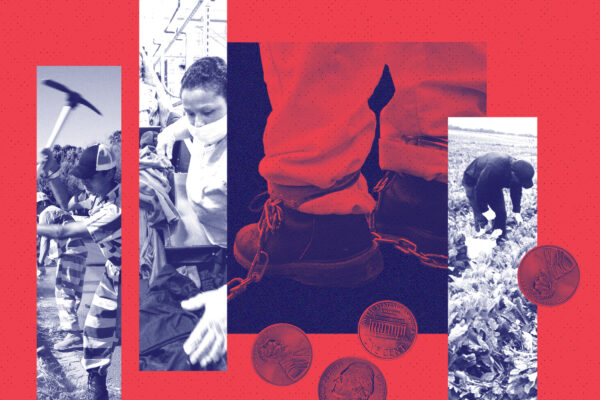NEW ORLEANS — Incarcerated workers in Louisiana prisons earn between $0.02 and $0.40 an hour providing vital public service and prison maintenance services, according to a comprehensive nationwide report released by the national American Civil Liberties Union and University of Chicago Law School Global Human Rights Clinic.
The first-of-its-kind report, Captive Labor: Exploitation of Incarcerated Workers, examines the use of prison labor throughout state and federal prisons in the U.S. and calls for far-reaching reforms to ensure prison labor is truly voluntary and that incarcerated workers are paid fairly, properly trained, and able to gain transferable skills. The report includes in-depth primary investigations in three case-study states — California, Illinois, and Louisiana.
“The United States has a long, problematic history of using incarcerated workers as a source of cheap labor and to subsidize the costs of our bloated prison system,” said ACLU of Louisiana Alanah Odoms. “Incarcerated workers deserve the same dignity and protections as other workers. This includes a fair wage, training, and basic workplace safety. It’s past time we treat incarcerated workers with dignity. If states and the federal government can afford to incarcerate 1.2 million people nationwide, they can afford to pay them fairly for their work.”
Key findings include:
- In Louisiana, work in cellblocks and field lines pays $0.02 per hour. Vocational programs pay $0.04 per hour. Legal workers and educational tutors are paid on a different pay scale, at $0.25 to $0.80 per hour. Some incarcerated workers must work for an initial period of up to three years without pay until they are eligible to be paid. Eligible incarcerated people may choose between earning a wage and receiving “good time” credits off their sentence.
- At the Louisiana State Penitentiary, known as Angola, the nation’s largest maximum-security prison situated on 18,000 acres of land that was originally the site of slave plantations, incarcerated workers work field crops including cotton, corn, soybeans, and sugarcane for only two cents an hour. This agricultural work has direct roots in the Black chattel slavery of the South.
- Every person incarcerated in Angola, 74 percent of whom are Black — and most incarcerated across Louisiana — starts work in the fields, and switching jobs is difficult. Field laborers work with limited access to water, minimal rest, and no restroom facilities, under the supervision of armed correctional officers on horseback.
- Workers report being placed in solitary confinement if they are unwilling or unable to perform work in the fields, or if they do not work fast enough.
- Formerly incarcerated agricultural workers at Louisiana’s Angola prison report witnessing other farm workers collapse from exhaustion or dehydration while working in the fields on hot days.
- DG Foods, a poultry processing plant in Bastrop, Louisiana, avoided shutting down operations at the height of COVID-19 by relying on incarcerated laborers who faced loss of their earned-time credits should they refuse to work.
- Louis Dreyfus Commodities, a commodities trader, purchased $2.4 million worth of corn and soybeans produced by incarcerated workers employed in the state prison industries program from 2017 to 2020, while numerous livestock auction companies purchased at least $5 million worth of livestock raised by workers incarcerated in Louisiana prisons during that same time period. The livestock sold at auction on the open market later finds its way as meat sold to consumers with no indication that it originated with the labor of incarcerated workers.
- A state legislative audit of the Louisiana Prison Enterprises program found that one-third of incarcerated people working in the state prison industries program are trained for jobs that are projected to decrease in the labor market, such as garment factory work and agriculture, finding that “many...may not be learning job skills that could help them after they are released.”
The exploitation of incarcerated workers is rooted in the “exception clause” to the 13th Amendment, which bars slavery except for people who have been convicted of crimes. In 20 states — and in the United States Constitution — exception clauses allow for workers in prisons to be exploited, underpaid, and excluded from workplace safety protection laws.
To combat the exploitation of incarcerated workers, the report makes several recommendations, including:
- Abolish exclusion clauses that allow forced labor as punishment for a crime.
- Ensure that all work in prisons is fully voluntary by eliminating any laws and policies that punish incarcerated people who are unable or unwilling to work.
- Allow incarcerated workers the same labor protections afforded to other workers in the United States, including minimum wage, health and safety standards, unionization, protection from discrimination, and speedy access to redress when their rights are violated.
- Institute comprehensive safety and training programs for all work assignments in correctional institutions.
- Invest in prison work programs that provide incarcerated workers with marketable skills and training that will help them to find employment after release and eliminate barriers to employment after release.
Read the full report here: aclu.org/captivelabor
Additionally, ACLU of Louisiana Executive Director Alanah Odoms advised on the newly-released film “Angola Do You Hear Us?” which tells the story of playwright Liza Jessie Peterson’s 2020 performance of her acclaimed play “The Peculiar Patriot” at Angola. There are thousands of men living in cages at Angola, most of whom are Black and sentenced to life without parole because of the nation’s racist criminal legal system and incredibly punitive and harsh sentencing laws. While devastating, “Angola Do You Hear Us?” has the power to activate audiences across the country to come together to end mass incarceration in Louisiana and beyond.
###
Stay Informed
Sign up to be the first to hear about how to take action.
By completing this form, I agree to receive occasional emails per the terms of the ACLU’s privacy statement.
By completing this form, I agree to receive occasional emails per the terms of the ACLU’s privacy statement.

